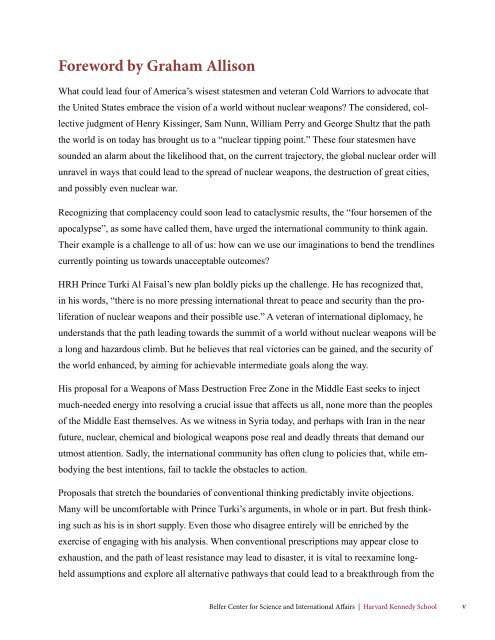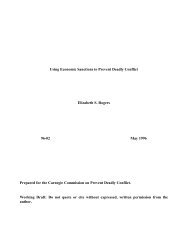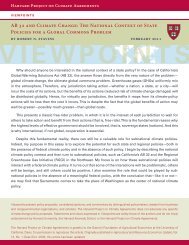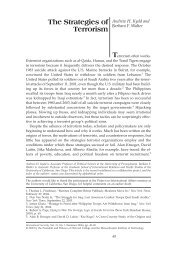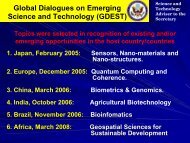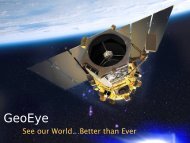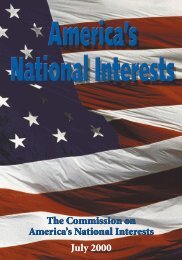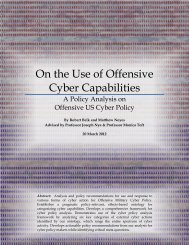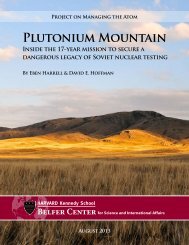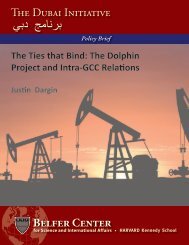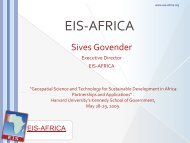A Political Plan for a Weapons of Mass Destruction-Free Zone ...
A Political Plan for a Weapons of Mass Destruction-Free Zone ...
A Political Plan for a Weapons of Mass Destruction-Free Zone ...
Create successful ePaper yourself
Turn your PDF publications into a flip-book with our unique Google optimized e-Paper software.
Foreword by Graham AllisonWhat could lead four <strong>of</strong> America’s wisest statesmen and veteran Cold Warriors to advocate thatthe United States embrace the vision <strong>of</strong> a world without nuclear weapons? The considered, collectivejudgment <strong>of</strong> Henry Kissinger, Sam Nunn, William Perry and George Shultz that the paththe world is on today has brought us to a “nuclear tipping point.” These four statesmen havesounded an alarm about the likelihood that, on the current trajectory, the global nuclear order willunravel in ways that could lead to the spread <strong>of</strong> nuclear weapons, the destruction <strong>of</strong> great cities,and possibly even nuclear war.Recognizing that complacency could soon lead to cataclysmic results, the “four horsemen <strong>of</strong> theapocalypse”, as some have called them, have urged the international community to think again.Their example is a challenge to all <strong>of</strong> us: how can we use our imaginations to bend the trendlinescurrently pointing us towards unacceptable outcomes?HRH Prince Turki Al Faisal’s new plan boldly picks up the challenge. He has recognized that,in his words, “there is no more pressing international threat to peace and security than the proliferation<strong>of</strong> nuclear weapons and their possible use.” A veteran <strong>of</strong> international diplomacy, heunderstands that the path leading towards the summit <strong>of</strong> a world without nuclear weapons will bea long and hazardous climb. But he believes that real victories can be gained, and the security <strong>of</strong>the world enhanced, by aiming <strong>for</strong> achievable intermediate goals along the way.His proposal <strong>for</strong> a <strong>Weapons</strong> <strong>of</strong> <strong>Mass</strong> <strong>Destruction</strong> <strong>Free</strong> <strong>Zone</strong> in the Middle East seeks to injectmuch-needed energy into resolving a crucial issue that affects us all, none more than the peoples<strong>of</strong> the Middle East themselves. As we witness in Syria today, and perhaps with Iran in the nearfuture, nuclear, chemical and biological weapons pose real and deadly threats that demand ourutmost attention. Sadly, the international community has <strong>of</strong>ten clung to policies that, while embodyingthe best intentions, fail to tackle the obstacles to action.Proposals that stretch the boundaries <strong>of</strong> conventional thinking predictably invite objections.Many will be uncom<strong>for</strong>table with Prince Turki’s arguments, in whole or in part. But fresh thinkingsuch as his is in short supply. Even those who disagree entirely will be enriched by theexercise <strong>of</strong> engaging with his analysis. When conventional prescriptions may appear close toexhaustion, and the path <strong>of</strong> least resistance may lead to disaster, it is vital to reexamine longheldassumptions and explore all alternative pathways that could lead to a breakthrough from theBelfer Center <strong>for</strong> Science and International Affairs | Harvard Kennedy Schoolv


